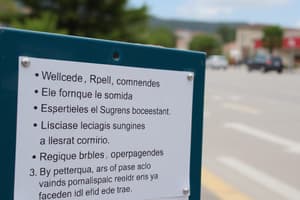Podcast
Questions and Answers
What form do you conjugate the verb for affirmative commands?
What form do you conjugate the verb for affirmative commands?
present tense él/ella/ud form
What is the affirmative command for 'decir'?
What is the affirmative command for 'decir'?
di
What is the affirmative command for 'hacer'?
What is the affirmative command for 'hacer'?
haz
What is the affirmative command for 'ir'?
What is the affirmative command for 'ir'?
What is the affirmative command for 'poner'?
What is the affirmative command for 'poner'?
What is the affirmative command for 'salir'?
What is the affirmative command for 'salir'?
What is the affirmative command for 'ser'?
What is the affirmative command for 'ser'?
What is the affirmative command for 'tener'?
What is the affirmative command for 'tener'?
What is the affirmative command for 'venir'?
What is the affirmative command for 'venir'?
What is the ir and ver affirmative tú command?
What is the ir and ver affirmative tú command?
How do you add an object pronoun to the sentence 'Pon la tarea' in the affirmative command?
How do you add an object pronoun to the sentence 'Pon la tarea' in the affirmative command?
Change 'levantarse' into an affirmative tú command.
Change 'levantarse' into an affirmative tú command.
Where is the normal stress if the word ends in a vowel, n, or s?
Where is the normal stress if the word ends in a vowel, n, or s?
Change 'hacerlo' into an affirmative tú command.
Change 'hacerlo' into an affirmative tú command.
How do you make a regular negative tú command?
How do you make a regular negative tú command?
What is the ending for -ar verbs when it is a negative command?
What is the ending for -ar verbs when it is a negative command?
What is the ending for -er & -ir verbs when it is a negative command?
What is the ending for -er & -ir verbs when it is a negative command?
Conjugate 'sacar' in the negative command.
Conjugate 'sacar' in the negative command.
Conjugate 'apagar' in the negative command.
Conjugate 'apagar' in the negative command.
Conjugate 'almorzar' in the negative command.
Conjugate 'almorzar' in the negative command.
What is the negative command for 'dar'?
What is the negative command for 'dar'?
What is the negative command for 'estar'?
What is the negative command for 'estar'?
What is the negative command for 'ir'?
What is the negative command for 'ir'?
What is the negative command for 'saber'?
What is the negative command for 'saber'?
What is the negative command for 'ser'?
What is the negative command for 'ser'?
Where do the pronouns go in the negative command?
Where do the pronouns go in the negative command?
Conjugate 'bórralos' in the negative command.
Conjugate 'bórralos' in the negative command.
Conjugate 'llena' in the negative command.
Conjugate 'llena' in the negative command.
Conjugate 'salir' in the negative command.
Conjugate 'salir' in the negative command.
Conjugate 'levantarse' in the negative command.
Conjugate 'levantarse' in the negative command.
Flashcards are hidden until you start studying
Study Notes
Affirmative Commands in Spanish
- Affirmative commands are conjugated using the present tense form for él/ella/usted.
- Key affirmative command conjugations include:
- Decir - di
- Hacer - haz
- Ir - ve
- Poner - pon
- Salir - sal
- Ser - sé
- Tener - ten
- Venir - ven
Object Pronouns with Commands
- When adding an object pronoun to commands, attach it to the end of the verb.
- Example: "Pon la tarea" becomes Ponla.
Stress Rules in Commands
- If a word ends in a vowel, 'n', or 's', the stress normally falls on the second to last syllable.
Changing Verbs into Affirmative Commands
- To form an affirmative command from reflexive verbs, such as "levantarse", use the tú form with a written accent: levántate.
- Example for adding additional pronouns: "hacerlo" changes to hazlo.
Negative Commands in Spanish
- Regular negative tú commands require the verb to be conjugated into the present tense yo form.
- For negative commands:
- -ar verbs end in es
- -er and -ir verbs end in as
Examples of Negative Command Conjugations
- Sacar becomes no saques
- Apagar becomes no apagues
- Almorzar becomes no almuerces
- Dar is no des
- Estar is no estés
- Ir is no vayas
- Saber is no sepas
- Ser is no seas
Placement of Pronouns in Negative Commands
- In negative commands, object pronouns are placed before the verb.
- Example: "bórralos" (delete them) changes to no los borres.
- Example: "llenar" changes to no llenes.
- Example: "salir" changes to no salgas.
- Example: "levantarse" changes to no te levantes.
Studying That Suits You
Use AI to generate personalized quizzes and flashcards to suit your learning preferences.




